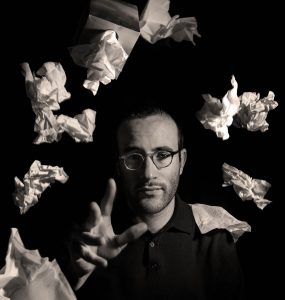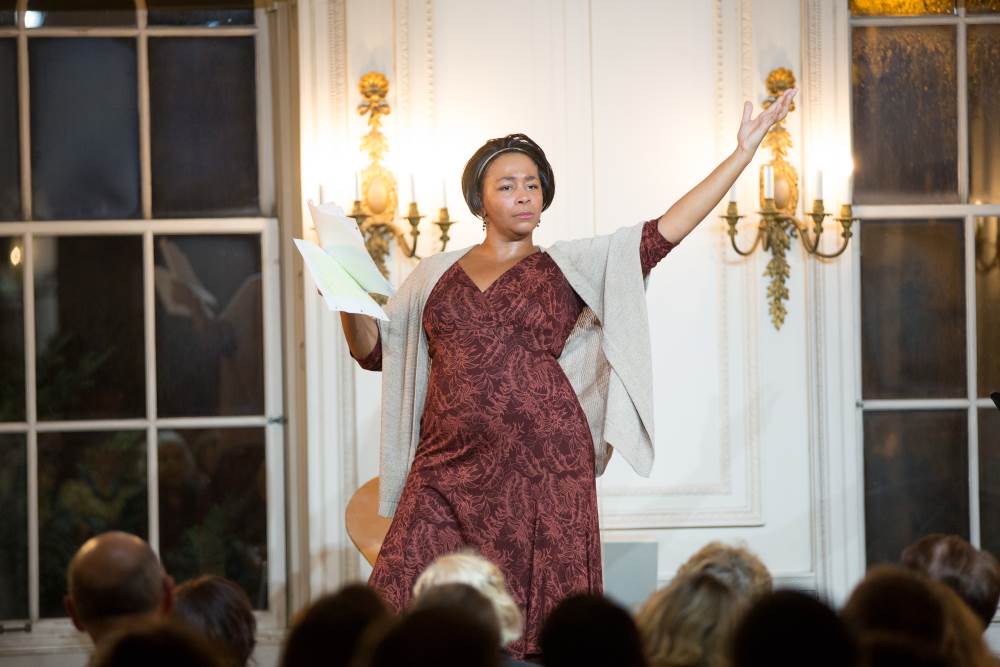CHALLENGE: To produce contemporary plays from beyond the U.S.
PLAN: Approach cultural institutions for commissioning money and translation support for readings.
WHAT WORKED: Universities are natural homes to translated works and provide resources and audiences.
WHAT DIDN’T: American producers are still not quick enough to produce foreign work.
WHAT’S NEXT: More translations.
Years ago during a discussion after a show I was performing in Toulouse, France, I asked a large group of teenagers if they attended a specifically arts-themed high school. “Oh, no,” a young woman scoffed. “We go to the agricultural high school. It’s just that in France people go to the theatre.”
My U.S. cohorts and I, amused and impressed by the young woman’s reply, tried to think of an American parallel but nothing quite seemed to fit.

Guy Ben-Aharon, who was born in Israel and came to Brookline, Mass., as a kid, has encountered similar disparities.
“Tel Aviv has one of the largest theatregoing audiences per capita in the world,” Ben-Aharon says. “My aunt is a kindergarten teacher and her husband drives a truck. They see a ton of theatre. What’s the equivalent in the U.S.?” It’s true, he concedes, that “theatre tickets are also really cheap in Israel. But still.”
After high school Ben-Aharon set out to Madrid to teach English for a gap year before starting at Emerson College in Boston. “I had arranged eight interviews and got seven job offers!” he recalls. “It was an amazing time to be in Madrid—right before the economic crash. I made great money and was able to travel.”
For the record, Ben-Aharon is the only person I’ve met who has claimed to have made great money teaching English abroad. He also “made lots of international friends and met diplomats. It opened up my eyes to the world, even if I already had a unique experience of growing up in Israel and the U.S.”
When Ben-Aharon began at Emerson the following year, he confesses, he was underwhelmed. “I went to the chair of the performing arts department, Melia Bensussen, and said, ‘I’m bored!’” In speaking with Bensussen, herself an Obie-winning theatre director, Ben-Aharon began to organize his thinking around the dearth of American companies producing foreign playwrights in translation.
“Sure, we see translated work in small ways,” Ben-Aharon allows, pointing out touring productions and name-checking companies such as Play Company and the Origin Theatre Company, both in New York City which are dedicated to presenting works by living international writers. At most theatres, on the other hand, Ben-Aharon notes, “We see Chekhov and Moliere, but I’d be surprised if an artistic director could name five major playwrights from abroad who are alive and translated into English.”
So starting the age of 19, the enterprising Ben-Aharon began to set to work, and in his second year of college presented a staged reading of A.B. Yehoshua’s Possessions. Israeli Stage was born. Six years and 40 translations later, Ben-Aharon’s company has spawned spin off branches that include German Stage (2012), Swiss Stage (2013), Austrian Stage (2014), French Stage (2016), and Scandinavian Stage (2016) with translations from Hebrew, German, Italian, French and Swedish into English.
“My interest is to showcase these scripts and build cultural bridges between American audiences and foreign writers,” he says.
To be clear: Ben-Aharon doesn’t personally speak all these languages—though he speaks Hebrew, French, and Spanish fluently and reads German “well enough.” Instead, he approaches foreign ministries and cultural associations to help pay translators’ fees and to serve as hosts for curated programs that include workshops and readings.
But Ben-Aharon remains actively involved in the translation process. For example, during the translation and rehearsal process for Austrian playwright Ewald Palmetshofer’s the unmarried woman, Ben-Aharon recalls hearing a German paragraph that was especially rhythmic. “There was a feeling repetition with a lot of ‘z’s and ‘t’s, so I told the translator, ‘I would like to honor the playwright; can you give me another version of this?’”
The fruits of Ben-Aharon’s enterprise have been numerous. For starters, over the past six years Boston residents and students have been exposed to myriad works in translation they wouldn’t have otherwise seen. And not just scattershot readings but a growing body of work: German playwright Theresia Walser has visited Boston on four occasions for various translations.
Ben-Aharon also notes the benefits for playwrights. “We give them a workshop, and we also always try to have them give a lecture at one of the local universities,” he says. This can be interdisciplinary, depending on a play’s topic—in March and April of next year, for instance, playwright Joshua Sobol will speak to students about social justice in conjunction with a workshop of a new play, David, King.
Ben-Aharon admits that while he’s disappointed with the response from theatre producers, he’s playing a long game via the universities and cultural institutions who have so far jumped on his bandwagon. Readings and lectures at these venues, he reasons, “get the future artistic directors of the world to see this work.”
It already seems to be happening: Boston’s Bridge Repertory Theater produced Reto Finger’s Dog Paddle in August with the Swiss Society of Boston, with Ben-Aharon directing. His next presentation, of Felix Mitterer’s Jägerstätter, will be on Dec. 1 at the Austrian Culture Forum in New York City.
But in an ever-thorny landscape, where first and second productions are hard enough for American writers to come by, why focus on international writers?
“We are looking inward when we should be looking outward,” Ben-Aharon declares, citing an economic argument. “Instead of looking at international work as a risk, we should look at it as a commodity. If something is a success on Broadway and wins a Tony award, it becomes a regional hit. If a play is a smash hit and has 15 productions in three years in Germany or France, we should think: ‘Wow! There must be something to that—it’s a proven success.’”
There are less tangible benefits too. “We gain something in translation,” he says. While American authors ask a certain set of questions, international writers have different training and unique lenses through which they see the world. “I am greatly interested in European minority playwrights in translation and the questions they are asking,” Ben-Aharon says. “Europe was never a land of immigrants, and suddenly the governments, societies, and now theatres are dealing with what that means. Can they fully recognize someone of Turkish background to be fully German, as Marianna Salzmann examines in Weißbrotmusik, Whitebreadmusic; or will a Muslim man of North African descent be treated as a Swede after a terrorist attack takes place in Stockholm, as Jonas Hassen Khemiri examines in I Call My Brothers?”
These plays challenge audiences to consider the complexity of globalization, as do the “dialogue reflections” Ben-Aharon pairs the plays with. These aren’t talkbacks, even if they happen post-show, he explains, but a unique chance for audiences to air questions, fears, thoughts. “We had a show about Jewish settler violence and there were right-wing people in the audience and left-wing people in the audience, and they were dealing with ideas through the lens of the play. As a theatremaker I want to use these translations as a platform to ask jarring questions.”
Playwright/performer Eliza Bent is a former senior editor of this magazine.
*An earlier version on this article failed to mention that Ben-Aharon speaks Hebrew, French, and Spanish fluently. In addition, German playwright Theresia Walser has visited Boston on four occasions, not three as previously written.


